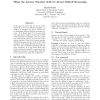Free Online Productivity Tools
i2Speak
i2Symbol
i2OCR
iTex2Img
iWeb2Print
iWeb2Shot
i2Type
iPdf2Split
iPdf2Merge
i2Bopomofo
i2Arabic
i2Style
i2Image
i2PDF
iLatex2Rtf
Sci2ools
100
Voted
KR
1989
Springer
1989
Springer
What the Lottery Paradox Tells Us About Default Reasoning
In this paper I argue that we do not understand the process of default reasoning. A number of examples are given which serve to distinguish di erent default reasoning systems. It is shown that if we do not make our assumptions explicit we get into trouble with disjunctive knowledge, and if we make our assumptions explicit, we run foul of the lottery paradox. None of the current popular default reasoning systems work on all of the examples. It is argued that the lottery paradox does arise in default reasoning and can cause problems. It is also shown that some of the intuitively plausible requirements for default reasoning are incompatible. How different systems cope with this is discussed.
Automated Reasoning | Default Reasoning | Default Reasoning Systems | Erent Default Reasoning | KR 1989 |
| Added | 11 Aug 2010 |
| Updated | 11 Aug 2010 |
| Type | Conference |
| Year | 1989 |
| Where | KR |
| Authors | David Poole |
Comments (0)

